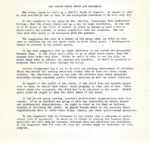Pine Mountain Settlement School
Series 23: RURAL YOUTH GUIDANCE INSTITUTE
1963 RURAL YOUTH GUIDANCE INSTITUTE REPORT (pp. 38-48)
TAGS: 1963 Guidance Institute Report (pp. 38-48) ; Harlan County Board of Education ; Harlan Independent Board of Education ; Lynch Independent Board of Education ; importance of teachers’ influence ; kindergarten ; Loyall ; dropouts ; grading systems ; fine arts education ; families’ responsibilities ; teachers’ responsibilities ; physical surroundings ; Wallins Area ; home visitations ; non-graded Primary Plan ; culture backgrounds ; reading ; health programs ; area economy ; public assistance ; special education ; measles ; youth needs ; youth resources ; the knowledge explosion ; homework ; professional ethics ; discipline ;
The 1963 Guidance Institute Report covers the 22nd annual meeting of youth leaders in Harlan County (KY). The meetings were sponsored by Harlan County Board of Education, Harlan Independent Board of Education and the Lynch Independent Board of Education.
The following are images and transcriptions of pages 38 through 48 of the 1963 Rural Youth Guidance Institute Report.
See also:
1963 RURAL YOUTH GUIDANCE INSTITUTE REPORT (pp. 1-25)
1963 RURAL YOUTH GUIDANCE INSTITUTE REPORT (pp. 26-37)
1963 RURAL YOUTH GUIDANCE INSTITUTE REPORT (pp. 38-48)
1963 RURAL YOUTH GUIDANCE INSTITUTE REPORT (pp. 49-58)
The PMSS Collections also contain material from several Youth Guidance Institutes held at the Pine Mountain Settlement School in the 1930s and 1940s. Images of those documents have been downloaded to this site and links to this material can be found here.
GALLERY – 1963 RURAL YOUTH GUIDANCE INSTITUTE REPORT (pp. 38-48)
- 1963 Guidance Institute Report. “Our Youth: Needs and Resources,” p. 38.
- 1963 Guidance Institute Report. “Our Youth: Needs and Resources,” p. 39.
- 1963 Guidance Institute Report. “Our Youth: Needs and Resources,” p. 40.
- 1963 Guidance Institute Report. “Our Youth: Needs and Resources,” p. 41.
- 1963 Guidance Institute Report. “Our Youth: Needs and Resources,” p. 42.
- 1963 Guidance Institute Report. “Our Youth: Needs and Resources,” p. 43.
- 1963 Guidance Institute Report. “Our Youth: Needs and Resources,” p. 44.
- 1963 Guidance Institute Report. “Our Youth: Needs and Resources,” p. 46.
- 1963 Guidance Institute Report. “Our Youth: Needs and Resources,” p. 47.
- 1963 Guidance Institute Report. “Our Youth: Needs and Resources,” p. 48.
[Scan_0038.jpg] Carbon copy of typewritten document, page 38.
-38-
10. Study child’s strength first — then give weakness last in reporting.
11. Teacher must be alert and more interested in teaching children than in receiving a pay check.
12. Refer to mental ability tests as scholastic aptitudes.
13. In English, social studies, and math, ask students to record words that they do not know and hand in — these are used in vocabulary work during the week.
14. Do not correct children during class in speech or manners. In oral reports, have students write down errors heard during the speeches or reports — Put them on the board at the conclusion.
15. Use tact in dealing with children, try to adjust to meet the needs.
16. Try to develop a feeling of civic pride by care of school property, books, etc. Teachers can do much by appealing to students as a whole.
17. In regular classroom, teach manners, speech, use of telephone — develop more concentrated plan or effort to meet the social needs of children. Have real learning situations. Learn by doing.
18. Other agencies may help us to meet the needs of the children.
19. Recommendation was made to the Harlan County School Board that kindergarten be made available to pre-school children (4-6 yrs)
a. Important in starting children to get along with each other.
b. Teach children proper setting of table, eating habits, etc.
20. An educated person knows what to do, when to do, and how to do.
* * * * * * * * * * * * * * * * * * * * * * * * * * * * * *
Sub-group III
Leader . . . . . . . . . . . . . . . . . Mrs. Anne McFarland
Recorder . . . . . . . . . . . . . . . Mrs. Mary E. Pope
Consultant . . . . . . . . . . . . . . Mr. P. G. Gillaspic
The main ideas brought out in the first session:
1. There exists an interdependence of home, community, and school; thus, we as teachers should feel a responsibility for school improvement.
2. Loyall has the backing of the majority of parents.
3. Where dropouts do occur they seem to run in families.
4. Our present grading system is misunderstood since many parents seem to measure social status in relation to their children’s grades.
[Scan_0039.jpg] Carbon copy of typewritten document, page 39.
-39-
Suggestions made for improvement:
1. Look at ourselves as teachers — study our attitudes toward children, toward our job, and toward the teaching field
2. Try to inform parents as the meaning of grades, especially that Cs indicate average work
3. Change the grading system to include two evaluations, one based on ability, the other on achievement
4. Have the attitude that there is something good about everyone and it is a teacher’s duty to treat every child fairly.
To help solve the dropout problem these suggestions were made:
1. Show a personal interest by having individual conferences with potential dropouts.
2. Visit the families and offer help
3. Keep fees at a minimum and give help in securing high school textbooks
4. To help the “dropout still in school” (the closed-minded) make more provisions for individual differences.
The following suggestions for improving the fine arts were made:
1. If children cannot appreciate Bach and Beethoven, begin with semi-classical music
2. In developing a liking for poetry begin with humorous poems and poetry on records
3. When plays are given at school choose those that will improve drama tastes
4. Encourage clubs that can help build cultural background
5. In high school use home room period to develop better tastes in art, music and poetry music and poetry
6. Stimulate a taste for good reading
7. Encourage the participation of students who hesitate to enter into new experiences in the arts
It was agreed that teachers make a difference in courses. The T. V . program “Experiment in Excellence” and newspaper articles on “Better Grades” were discussed. It was pointed out that every teacher should help the English teacher by using correct grammar and watching for English errors. They should count off for misspelled words in any subject. Teachers should not always talk on students’ levels but should use new words to challenge them.
Families share the responsibility for children who fail. However, teachers are also at fault. If teachers are genuinely interested in their pupils, try to teach right from wrong, and convince pupils that they have to be hard on them for their own benefit, most students will respond.
It was the opinion of the group that many boys and girls from feeder schools are overwhelmed by registration at Loyall and may drop out. Registration should be in small groups ahead of time. A practice run-through of the schedule may aid in the adjustment to a new school.
[Scan_0040.jpg] Carbon copy of typewritten document, page 40.
-40-
Sub-group IV
Leader . . . . . . . . . . . . . . . . . Mrs. Maurine Grant
Recorder . . . . . . . . . . . . . . . .Mrs. J. Ray Rice
Consultant . . . . . . . . . . . . . . Dr. Emmitt Burkeen
if we were really concerned we would work more diligently with those who are entrusted to us. We are investing in life and should strive to make a worthy investment.
All students will not produce alike but each should be taught to produce to the best of his ability. Talents vary and we cannot cast students in a common mold. A two track school, academic courses and trade school courses would be one solution. We are putting too much emphasis on getting a high school diploma.
One of the main objectives of our public schools is to teach our culture and not merely to equip students to earn money.
Guidance and coaching are needed if the classroom teacher is to teach music. It is suggested that teachers in our area visit Loyall and observe Mr. Veach at work in the music department and Mrs. Cornett in the art department.
Each teacher should take a good look at himself in every day life. As we look at ourselves we should ask if we should be in a classroom.
Success in doing the best one can with what one has.
To change our thinking and culture will take a generation. Education is a slow process and our culture can only be changed by education.
September 20 [1963]
Physical properties do make a difference in a learning situation. Children learn more and are happier while doing so if the surroundings and materials are attractive. A well organized room is inducive to learning. It is also important to keep the
to keep the temperature of the room a comfortable degree.
The teacher is the key person in making and developing the ideals and academic training of youth. The attitude of the teacher influences the environment of the classroom. The most important thing in any classroom is the teacher.
Children of today are spoiled by parents and teachers. They are not expected to do the things that will develop strong character and self sufficient lives. They do not accept responsibility as they should and the home is, in a large measure, responsible for this.
Teachers should strive constantly for self improvement, both academically and culturally. By so doing they will be better equipped to influence and mold the lives of those who are entrusted to their care and training.
[Scan_0041.jpg] Carbon copy of typewritten document, page 41.
-41-
WALLINS AREA
Sub-group I
Leader . . . . . . . . . . . . . . . . . . Mr. Howard Maxwell
Recorder . . . . . . . . . . . . . . . . Mrs. Carolyn Saylor
Consultant . . . . . . . . . . . . . . . Mrs. Ann Shelley
OUR YOUTH — THEIR NEEDS AND RESOURCES
The school needs to build up a child’s faith in himself. He should be made to feel worthwhile and to feel he can accomplish something if he will only try.
It was suggested in our group by Mrs. Shelley, Consultant from Cumberland College, that the school should set up a day for home visitation. If the day is to be given at the first of school, it would be better to wait a little while — until the teacher is better acquainted with her students. She can then know what needs to be discussed with the parents.
The suggestion was made by a member of the group that, in order to take care of children who are not quite ready to start first grade, a kindergarten should be started in our school system.
It was also suggested that we might introduce in our system the non-graded Primary Plan. If the child isn’t ready to go on after three years, keep him another year under this plan. Before we would be able to use the plan, we would first have to educate the parents and teachers. It would be possible to acquaint them with the plan through the P.T.A.
Culture background has a lot to do with the reading advancement of children, Those who haven’t had reading materials around them at home are often slower readers. We, therefore, need to see that the children have these materials available through extended public library services as well as school services.
In regard to the health of the child, if the child does not receive proper food at home, we should have school lunch programs to take care of him. Where dental needs are concerned, the child has to be educated to his needs. Health units could be taught to make the child aware of his needs.
In our second group meeting, teachers professional organizations were discussed. If we as teachers are going to have any leadership we should attend our professional organizations. We ought to stand up for what we believe, instead of following the crowd. We should become aware of the services these organizations have to offer — free films, charts, and other audio-visual materials.
It was suggested that we recommend to our school that a chairman of audio-visual aids be appointed. He would be in charge of storing and issuing these materials and also keeping teachers informed when new materials are available. It was suggested that the room off from the library might be available for this purpose.
[Scan_0042.jpg] Carbon copy of typewritten document, page 42.
-42-
Someone thought it might be a good idea for the school system to have workshops during the years to keep teachers up to date on new methods of teaching. They should be planned for at the beginning of the year and inserted to the school calendar.
* * * * * * * * * * * * * * * * * * * * * * * * * * * * * *
Sub-group II
Leader . . . . . . . . . . . . . . . . . .Mrs. Edna Baute
Recorder . . . . . . . . . . . . . . . . Mrs. Edith Hensley
Consultant . . . . . . . . . . . . . . .Mr. William Hayes
Why so many dropouts in our schools today?
1. Indifferent parents
2. Students aren’t interested
3. Are our schools meeting the needs of the students?
What can we do about dropouts?
1. Home visits
2. Invite parents to visit the school
3. Conferences with parents
4. Adult classes
5. Plan our work to meet the needs of students in our classrooms.
6. Make school work interesting.
7. Offer special training or remedial courses for children who need them.
8. Show we are interested in our students and the community where we are teaching.
9. Have a plan and a goal for each day.
10. When showing errors be kind not scornful.
Classroom teacher and physical surroundings for the total development of pupils.
1. The teacher is the important factor in each classroom. Can the teacher carry over to the student the desire to learn?
2. A good health program, not just teaching health rules.Then to get children to practice them.
a. Milk program
b. Hot lunch program
3. Readiness program for pre-school children.
4. Remedial program for children who need it.
a. Team teaching
b. Primary block
5. Investigate all absentees
[Scan_0043.jpg] Carbon copy of typewritten document, page 43.
-43-
Sub-group III
Leader . . . . . . . . . . . . . . . .Mrs. Rhoda
Verbal Recorder . . . . . . . .Mrs. Nina Adkins
Consultant . . . . . . . . . . . . .Dr. Roscoe V. Buckland
Session 1 – Our Cultural Background
What is lacking in our cultural background? Parental influence — Parents expect the school to do the job of both home and church. Lack of nourishment — even those receiving ADC often use the money unwisely and the children are listless, pale, and sleepy. Many parents lack adequate education for today’s world yet fail to see the importance of their children’s education. Jobs for those people are hard to find. When the miners worked they lived well, but young people now have to go to the city to find work. Many have lost their pride and their sense of self-acceptance.
Suggestions for improving economy of area. Impounding water ways would prevent floods, provide water for factories, and make possible recreational activities for tourist attraction. Roads are a necessity. Industry shies away from labor troubles.
The solution to eastern Kentucky’s problems lies in education, Future potential of a child is hard to estimate and predict. We must never lose hope.
The drop-out problem was discussed. Wisconsin has a 2% rate where Kentucky has about 50%. Why? Good guidance program in Wisconsin. Lexington has a big brother program which shows concern for the individual. Impractical for Wallins because of the lack of recreational facilities in our area. 5% of children give 95% of the trouble.
Families receiving public assistance often do not accept citizenship responsibilities. Lots of red tape makes effective dealing with a situation difficult. Does ADC encourage illegitimacy? No, Mr. Johnson said. Divorces sometimes enable family to draw public assistance. Amount received is so small that one exists rather than lives. There are good dental and medical programs, but families are often reluctant to make use of the services available.
Some people on assistance are better off than some families that do not receive aid. ADC does keep some children in school and prevents their dropping out for a time, but those children often don’t seem to profit much from their opportunity. The child should not be made to feel inferior because he receives assistance.
What has happened to the teacher’s position in the community? Increasing requirements for certification have resulted in a higher cultural appreciation level, and regular pay checks, as compared with the many unemployed or receiving government help, have placed teachers in a higher economic bracket than they used to be. Lack of a large middle class (the class which usually get things done) is one of our largest handicaps.
[Scan_0044.jpg] Carbon copy of typewritten document, page 44.
-44-
Session II – Importance of the classroom teacher and the physical surroundings in the total development of pupils.
You forget what you learn, or most of it, but you don’t forget your teacher or his way of teaching. The teacher needs to be a balanced individual if he is to turn out well-rounded personalities. The lecture method is usually unsatisfactory at the secondary level. No one method of grouping is better than another for the normal child.
Children read easy books because it requires less effort. I.Q.’s change and are often unreliable. Children can often help each other. Grades are necessary evil, but are not necessarily a full evaluation of the student. There are few clear-cut answers when dealing with human beings.
Reading is basic to other subjects. Build success on success. Find some way each person can excel. We’re all illiterate at some points.
Children with physical or mental handicaps should have special teachers. Initiative and motivation are more important than I.Q. High grades do not ensure success. Common sense and knowing how to get along with people are much more important.
Night comes to the Cumberlands? Not necessarily. It isn’t all dark but such books make it harder to attract new industries and improve our conditions.
Good lighting and attractive appearance of physical surroundings help the morale of teacher and student. We need an increase in the maintenance staff and/or the services they perform. Restrooms need to be kept clean and in working order.
Consolidation only adds to the load of existing facilities. Playground facilities are not always adequate.
Informality on the part of the teacher often gives rise to discipline problems. Grouping within the classroom in the grades has definite advantages. But one outstanding shortcoming of the philosophy of taking them where you find then and taking them as far as you can is that, when they reach high school, the poorer students become failures and drop out.
[Scan_0045.jpg] IMAGE IS MISSING
[Scan_0046.jpg] Carbon copy of typewritten document, page 46.
-46-
VI. Why do measles kill so many people?
A. Today measles is one of the most common causes of death because the other diseases have been conquered by immunizations.
B. Measles is a virus which reaches any part of the body and may damage any part of the body.
C. Measles can cause pneumonia, brain fever or other illnesses.
The topic of drop-outs was discussed through the five following questions and attempted answers:
I. Why do children drop out of school?
A. Parents discourage children, before they are old enough to enter school, by not answering their questions.
B. Pupils are not interested in what they are studying but they are forced to participate.
C. Just don’t care about school
D. There are not enough extra activities in the small schools. A busy student is a happy student.
E. Pupils are more interested in working to make money than in getting an education.
F. Failing one or more subjects may discourage a pupil so much that he does not want to stay in school.
G. Some teachers make pupils feel they are not wanted in the class.
H. The slow student may feel that a busy teacher gives more individual attention to the better students.
I. Lack of individual attention from the teacher
J. Most classrooms are too crowded.
K. Lack of leisure time.
L. The influence of friends who have dropped out.
II. About what percent of children drop out of school each year?
A. The percent of drop outs varies with each community.
III. What are Youths Needs and Resources?
The group discussed these two points separately.
A. The needs were as follows:
1. A high school education, at least
2. A college degree would enable one to obtain a better job.
3. Interested parents
a. Parents should participate in school activities.
b. Parents should provide necessary things for school.
c. Parents should have good attitude toward school.
4. Good medical care
5. More physical education
6. An interest in one’s own life and future
7. Bigger and better schools
8. Youth organizations
9. Religious organizations
B. Youth resources were as follows:
1. Youth itself is a resource for the future.
2. Ability to gain knowledge
3. Health
4. Freedom
[Scan_0047.jpg] Carbon copy of typewritten document, page 47.
-47-
5. Privilege of voting.
6. Freedom of worship and speech.
7. Ability to govern ourselves.
8. Freedom to refuse knowledge.
9, Freedom to do what we think is right as long as it doesn’t interfere with others.
10. Responsibility.
IV. Why do teachers choose the career of teaching?
A. To pass knowledge on to others.
B. Money.
C. to enforce their will on others,
V. What is the knowledge explosion?
The knowledge explosion is adapting our way of life to present conditions.
VI. What is the most important instrument in the learning process?
A good strong teacher.
[Scan_0048.jpg] Carbon copy of typewritten document, page 48.
-48-
YOUTH GROUP ‘”B”
Leader . . . . . . . . . . . .Mr. Frank Simpson
Recorder. . . . . . . . . . Mrs. Anna Jo Creech
Reporter. . . . . . . . . . . Loverne Kilgore
Group B was composed of children from the seventh and eighth grades.
The following conclusions were reached after discussion among the young people.
I. Homework
Homework should be given with a definite purpose in mind. Every pupil will not need homework.
Homework should never be given as a means of discipline.
II. Grading
Pupils should be graded according to ability.
III. Professional Ethics
Teachers should conduct themselves properly at all times, thus, setting the correct example for students.
IV. Student Behavior
Students should show proper respect to teachers by good behavior and necessary preparation for class.
V. Teacher Preparation
Students are entitled to qualified teachers who are interested in teaching and who will come to class prepared to do so.
Go to: 1963 RURAL YOUTH GUIDANCE INSTITUTE REPORT (pp. 38-48)
Return to: GUIDE TO RURAL YOUTH GUIDANCE INSTITUTES BY YEAR











